Part-2
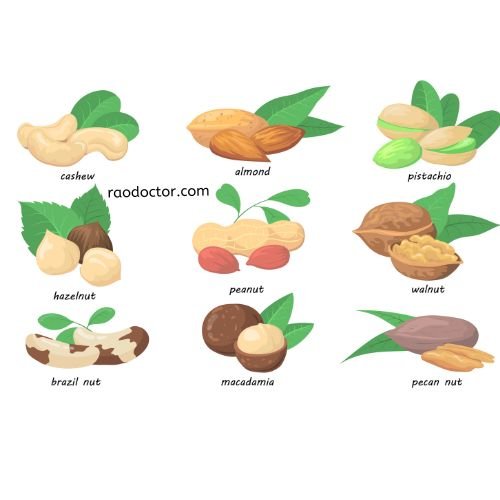
Introduction
Nuts are a great source of nutrition for people of all ages and lifestyles. They are a delicious and nutritious snack that can help you power up your day! With so many different types of nuts, it is easy to find one that fits your individual needs and preferences.
Not only are nuts tasty and convenient, but they also offer numerous health benefits. From reducing inflammation and improving heart health to providing essential nutrients, minerals, and vitamins, there is no shortage of advantages to adding nuts to your diet.
About a while back, I had written an article on Seeds to eat. If you have not read it, you can do so here-
While most of the nutritional facts about all nuts may appear the same, there are some exceptions. Read on to learn about these 10 types of nuts and the health benefits they offer.
Walnuts
Walnuts are the nuts from the trees of the same name and are rich in healthy fats. They are a good source of protein (19%), fiber, and omega-3 fatty acids. They also contain a large amount of minerals and vitamins, such as iron, calcium, and vitamin B3. Walnuts can be eaten fresh, roasted, or as nut butter.
Nutritional value of 100 gm Walnuts-
- Calories: 654 kcal
- Carbohydrates: 14.7 g
- Protein: 15.2 g
- Total Fat: 65.2 g
- Saturated Fat: 4.2 g
- Monounsaturated Fat: 44.3 g
- Polyunsaturated Fat: 15.7 g
- Fiber: 6.7 g
- Vitamin E: 10.3 mg
- Vitamin B6: 0.3 mg
- Folate: 60 mcg
- Magnesium: 153 mg
- Phosphorus: 291 mg
- Potassium: 441 mg
- Iron: 2.3 mg
- Calcium: 78 mg
- Zinc: 2.3 mg
- Copper: 1.9 mg
- Manganese: 2.2 mg

Health Benefits of eating Walnuts-
Almonds are a rich source of protein, monounsaturated fats, and fiber, which can help to reduce cholesterol and regulate blood sugar levels.
In addition, almonds are a great source of magnesium and Vitamin E, which can help to prevent cognitive decline, lower blood pressure, and promote healthy skin and hair. Almonds are also a good source of calcium, which can help to prevent bone loss and protect against osteoporosis.
Not to mention, almonds are a delicious snack that can be enjoyed while on the go or when relaxing at home. They can be eaten plain, tossed into a salad, added to a trail mix, or even used as a topping for baked goods, like muffins or quick breads.
Useful Resource- Walnuts
PISTACHIO
Pistachios are the edible seeds of a tree species in the same family as the mango. They are a good source of protein (18%), fiber, and omega-3 fatty acids.
They also contain a large amount of minerals and vitamins, such as iron, calcium, zinc, and vitamins E, C, B3, and B6. Pistachios can be eaten fresh or roasted, used in baked goods, or ground into butter.

Nutritional facts of 100gm Pistachio
- Calories: 562 kcal
- Protein: 20.1 g
- Total Fat: 44.3 g
- Carbohydrates: 28.3 g
- Dietary Fiber: 10.3 g
- Sugar: 5.3 g
- Calcium: 2.4 mg
- Iron: 2.2 mg
- Sodium: 8 mg
- Potassium: 760 mg
Health Benefits of Pistachios: –
- They are a good source of protein – 18% of your daily protein intake can come from pistachios.
- They contain high amounts of fiber – This helps to keep you full for longer and can help lower blood cholesterol.
- They are a good source of omega-3 fatty acids – This can help lower blood pressure and reduce the risk of heart disease.
- They are a great source of minerals and vitamins – This can help to support your general health and keep your body in good condition.
- They are good for your digestive health
- They are high in fiber, which can help regulate your bowel movements.
- They can help you lose weight – Pistachios are very low in calories and can help you lose weight.
This tasty treat can be eaten plain or used as a topping for baked goods or salads. It can also be ground into a powder and used as a thickening agent for soups and stews.
ALMONDS
Almonds are the edible seeds of an almond tree, which is native to Southwest Asia. Almonds are one of the most popular and well-known types of nuts, and for good reason. This delicious nut provides numerous benefits to the health of both mind and body.

Nutritional facts of 100 gm Almonds
- Calories: 576
- Total Fat: 49.2 g
- Saturated Fat: 3.9 g
- Polyunsaturated Fat: 34.3 g
- Monounsaturated Fat: 10.2 g
- Cholesterol: 0 mg
- Sodium: 2 mg
- Potassium: 705 mg
- Total Carbohydrate: 22.5 g
- Dietary Fiber: 12.5 g
- Sugars: 4.5 g
- Protein: 21.2 g
- Calcium- 267 mg
Almonds are a rich source of protein, monounsaturated fats, and fiber, which can help to reduce cholesterol and regulate blood sugar levels.
In addition, almonds are a great source of calcium, magnesium and Vitamin E, which can help to prevent cognitive decline, lower blood pressure, and promote healthy skin and hair.
Almonds are also a good source of calcium, which can help to prevent bone loss and protect against osteoporosis. Not to mention, almonds are a delicious snack that can be enjoyed while on the go or when relaxing at home.
They can be eaten plain, tossed into a salad, added to a trail mix, or even used as a topping for baked goods, like muffins or quick breads.
Useful resource- Harvard Education
Cashews
Cashews are a tasty and nutritious type of nut that is a great source of protein and monounsaturated fats. These fats can help to lower cholesterol and prevent heart disease. In addition, they are a good source of magnesium, Vitamin E, and zinc, which can help to protect against cognitive decline, regulate blood pressure, and promote healthy skin.
Nutrional Value of 100 gm Cashew nut
- Energy: 553 kcal
- Carbohydrates: 30.19 gm
- Protein: 18.22 gm
- Total Fat: 44.27 gm
- Dietary Fiber: 3.3 gm
- Calcium: 16 mg
- Iron: 7.6 mg
- Magnesium: 292 mg
- Potassium: 660 mg
- Sodium: 11 mg
- Zinc: 4.36 mg

Beyond the many benefits of cashews for the heart and mind, this tasty treat also provides a good amount of calcium, which can help to prevent bone loss and protect against osteoporosis.
Furthermore, cashews are also a rich source of iron, which can help to promote healthy hair, growth, and red blood cell production.
These tasty nuts can be eaten plain, tossed into a trail mix, or used as a topping for baked goods such as quick breads, muffins, or cookies.
Hazel Nuts
Hazel nuts are a tasty type of nut that is rich in protein, monounsaturated fats, and fiber. These fats can help to lower cholesterol and prevent heart disease.
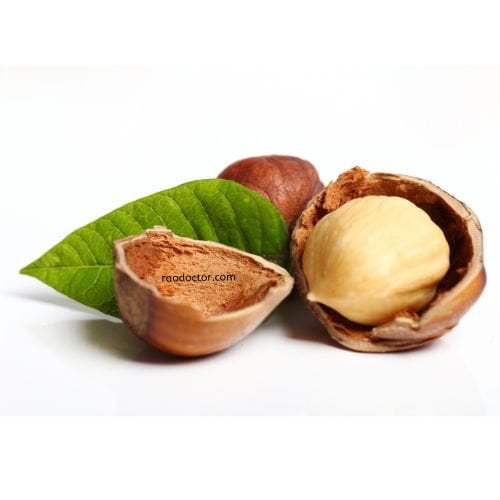
Nutrional value of 100 gm Hazelnuts
- Calories: 628 kcal
- Protein: 15.7 g
- Total fat: 61.2 g
- Total Carbohydrate: 17 g
- Dietary fiber: 9.7 g
- Sugar: 4.7 g
- Calcium: 98 mg
- Iron: 3.7 mg
- Magnesium: 176 mg
- Phosphorus: 345 mg
- Potassium: 628 mg
- Sodium: 6 mg
- Vitamin C: 4.3 mg
In addition, pistachios are a good source of magnesium, Vitamin E, and zinc, which can help to protect against cognitive decline, regulate blood pressure, and promote healthy skin. Beyond these benefits, hazelnuts are a great source of iron and copper, which can help to promote healthy hair, growth, and red blood cell production.
Peanuts
Peanuts are a tasty type of nut that is rich in protein and monounsaturated fats. These fats can help to lower cholesterol and protect against heart disease. In addition, peanuts are a good source of magnesium, Vitamin E, and zinc, which can help to protect against cognitive decline, regulate blood pressure, and promote healthy skin.
Nutritional facts of 100 gm Peanuts
- Calories: 567 kcal
- Total Fat: 49.2 g
- Saturated Fat: 8.2 g
- Monounsaturated Fat: 25.6 g
- Polyunsaturated Fat: 11.7 g
- Carbohydrates: 16.1 g
- Fiber: 8.5 g
- Sugar: 4.7 g
- Protein: 25.8 g
- Sodium: 2 mg
- Potassium: 705 mg
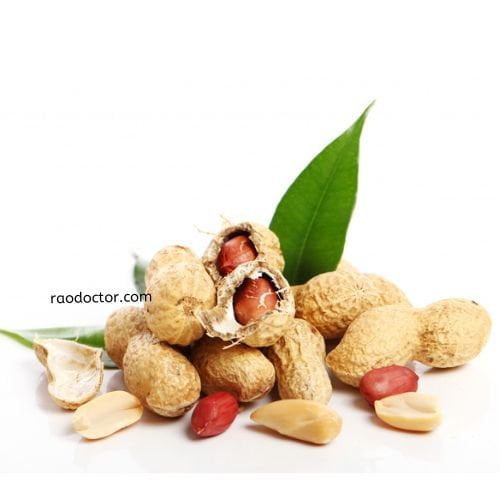
Beyond these benefits, peanuts are a great source of iron and copper, which can help to promote healthy hair, growth, and red blood cell production. This tasty treat can be eaten plain, salted or used as a topping for baked goods or salads. It can also be ground into a powder and used as a thickening agent for soups and stews. In India it is used to make delicious sweets in combination with jaggery called Chikki.
Brazil Nuts
Brazil nuts are a tasty type of nut that is rich in protein and monounsaturated fats. These fats can help to lower cholesterol and protect against heart disease. In addition, Brazil nuts are a good source of magnesium, Vitamin E, and zinc, which can help to protect against cognitive decline, regulate blood pressure, and promote healthy skin.

Nutritional value of 100 gm Brazil nuts
- Calories: 656 kcal
- Total Fat: 66.2 g
- Saturated Fat: 10.6 g
- Polyunsaturated Fat: 11.8 g
- Monounsaturated Fat: 33.7 g
- Cholesterol: 0 mg
- Sodium: 4 mg
- Potassium: 690 mg
- Total Carbohydrates: 13.7 g
- Dietary Fiber: 8.5 g
- Sugars: 3.3 g
- Protein: 14.3 g
Beyond these benefits, Brazil nuts are a great source of iron and copper, which can help to promote healthy hair, growth, and red blood cell production. This tasty treat can be eaten plain or used as a topping for baked goods or salads. It can also be ground into a powder and used as a thickening agent for soups and stews.
Macadamia Nuts
Macadamia nuts are a tasty type of nut that is rich in protein and monounsaturated fats. These fats can help to lower cholesterol and protect against heart disease.
In addition, macadamia nuts are a good source of magnesium, Vitamin E, and zinc, which can help to protect against cognitive decline, regulate blood pressure, and promote healthy skin.
Nutritional facts of 100 gm Macadamia nuts
- Total Fat: 76.8 g
- Saturated Fat: 11.7 g
- Monounsaturated Fat: 56.2 g
- Polyunsaturated Fat: 4.3 g
- Protein: 7.8 g
- Carbohydrates: 10.3 g
- Dietary Fiber: 7.3 g
- Iron: 2.2 mg
- Magnesium: 72 mg
- Potassium: 191 mg
- Cholesterol: 0 mg
- Sodium: 1 mg
- Calories: 718 kcal
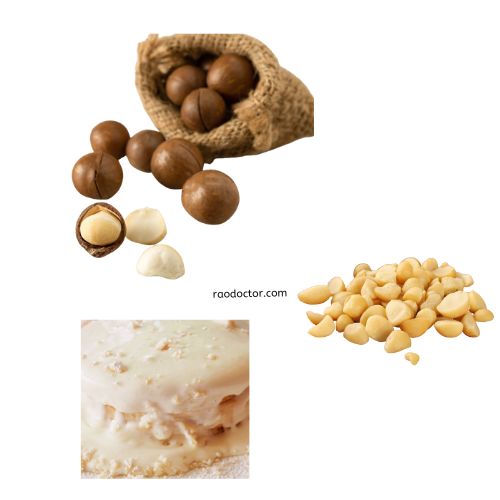
Beyond these benefits, macadamia nuts are a great source of iron and copper, which can help to promote healthy hair, growth, and red blood cell production. This tasty treat can be eaten plain or used as a topping for baked goods or salads. It can also be ground into a powder and used as a thickening agent for soups and stews.
Pecan nuts
Pecans are a tasty type of nut that is rich in protein, monounsaturated fats, and fiber. These fats can help to lower cholesterol and protect against heart disease.

Nutritional value of 100 gm Pecan nuts
- Calories: 691 kcal
- Total Fat: 72.6 g
- Saturated Fat: 6.5 g
- Polyunsaturated Fat: 33.3 g
- Monounsaturated Fat: 28.3 g
- Cholesterol: 0 mg
- Sodium: 1 mg
- Potassium: 290 mg
- Total Carbohydrate: 13.7 g
- Dietary Fiber: 9.1 g
- Sugar: 3.7 g
- Protein: 9.2 g
- Calcium-73.8 mg
In addition, pecans are a good source of calcium, magnesium, Vitamin E, and zinc, which can help to protect against cognitive decline, regulate blood pressure, and promote healthy skin and bone health. Beyond these benefits, pecans are a great source of iron and copper, which can help to promote healthy hair, skin, and nails.
Pine Nuts
Pine nuts are a tasty type of nut that is rich in protein, fiber, manganese, and Vitamin B6. These nutrients can help to promote healthy brain function, boost your metabolism, and protect against heart disease.
Nutritional value of 100 gm Pine nuts
- Calories: 673 kcal
- Total Fat: 68 g
- Saturated Fat: 6 g
- Polyunsaturated Fat: 34 g
- Monounsaturated Fat: 27 g
- Cholesterol: 0 mg
- Sodium: 6 mg
- Potassium: 721 mg
- Total Carbohydrate: 11 g
- Dietary Fiber: 3 g
- Sugars: 2 g
- Protein: 13 g
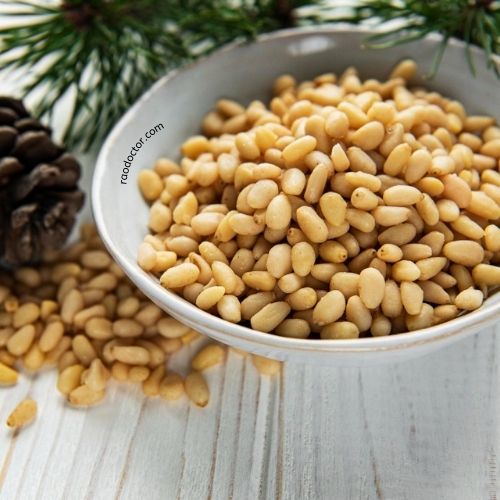
In addition to these benefits, pine nuts are a good source of magnesium, calcium and Vitamin E. These nutrients can help to regulate blood pressure and promote healthy skin. Pine nuts also contain iron and copper which can help to promote healthy hair, skin and nails.
Where to get these nuts-
You can buy all these nuts online on Amazon.com. I am providing the links to different countries below to help you choose and buy the best quality nuts on Amazon at competitive prices –
India
United States
Disclosure-
Some of the links used in this article are affiliate links. i.e., if you sign up for their paid program or make a purchase, I will get a commission, at no extra cost to you. Please be rest assured that I only recommend software/ products I genuinely believe in, and trust to be good for you too.
Watch this very interesting video on the health benefits of eating nuts for elderly or senior people –
Final words
Now that you have heard and read about these nuts, how about sharing with me your own experience of eating them?
I have personally eaten about five of these ten nuts and am doing it even today. They have helped me keep cholesterol under control as well as improve my learning capacity.
If you have enjoyed reading this article, do consider sharing it on your social media groups through the buttons at the bottom of this article. You can also share this on your Twitter account by clicking this link below-
10 best Nuts to keep You Healthy and Fit Share on XMy next topic
My next topic will be a talk on Aging. Do you know that we have 2 types of ages? You are probably aware of your age by birth date, which you cannot change.
But there is another type which you can alter and add years to your actual age. Stay tuned in for this very interesting article.
Till then- Adios.

